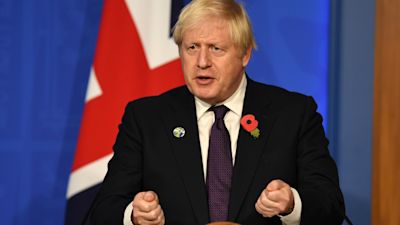Watered-down wording for coal in COP26 deal doesn't 'make that much of a difference' - Boris Johnson

Boris Johnson said the watered-down language for coal promises in a COP26 deal "doesn’t seem to make that much of a difference".
At a Downing Street briefing on Sunday, the prime minister however did "fully and humbly" accept the Glasgow Pact agreed by nearly 200 countries at the COP26 climate summit had not delivered the "full solution" to climate change.
The deal was agreed at the eleventh hour after India and China called for a last-minute change to the wording: from promises to “phase out” the use of unabated coal - coal generated without the use of technologies to reduce CO2 emissions - to "phase down".
Many European and vulnerable countries expressed disappointment at the change.
Mr Johnson told the press conference: “It’s an immense thing to get a commitment from 190 countries to phase down or phase out coal.
“Whether the language is phase down or phase out doesn’t seem, to me as a speaker of English, to make that much of a difference. The direction of travel is pretty much the same.
“And that’s never been said before”.
He hailed the agreement as “game-changing”, but added: “Of course, my delight at this progress is tinged with disappointment.
“Those for whom climate change is already a matter of life and death, who can only stand by as their islands are submerged, their farm land turned to desert, their homes battered by storms, they demanded a high level of ambition from this summit."
Mr Johnson insisted the goal of restricting global warming to 1.5 degrees "is still alive".
COP26 President Alok Sharma, who was also at the Downing Street briefing, said he was emotional when negotiations concluded because he felt “the weight of the world” on his shoulders.
Towards the end of the summit on Saturday, Mr Sharma appeared close to tears as he apologised for the last-minute change.
Mr Sharma said on Sunday: “I can tell you there was one really tense hour where I did feel the weight of the world on my shoulders… this deal was absolutely in jeopardy. We got it over the line.”
He added: “The reason I said sorry… at the event was not because I thought that we didn’t have a historic achievement, it’s because at the end, people thought the process was opaque.”
Mr Sharma said he would have “preferred stronger language” in relation to coal but said COP26 had “moved the goalposts in terms of our generation and future generations”.
Alok Sharma was left in tears as he announced the COP26 deal on Saturday evening
Mr Sharma said in media interviews earlier on Sunday that China and India will have to “justify” their decision and "explain themselves".
He also told Sky News’ Trevor Phillips On Sunday programme: “Yes, of course I would have liked to ensure we maintain the ‘phase out’ rather than changing the wording to ‘phase down’, but on the way to phasing out, you’ve got to phase down.
“But, ultimately, of course, what we need to ensure is that we continue to work on this deal, on these commitments, and on the issue of coal, China and India are going to have to justify to some of the most climate vulnerable countries what happened.”
Mr Sharma said the two-week summit, which ended on Saturday after running 24 hours in extra time, had “kept 1.5C within reach”.
He also hailed the UN climate agreement as the "first" to have coal commitments written into it.
But shadow business and energy secretary Ed Miliband said Glasgow’s aim of keeping global temperatures from rising to 1.5C above pre-industrial levels were in “intensive care”, with a “chasm” between what was agreed in Scotland and what needs to be done to slash emissions.
Lance Martin, a resident in Hemsby, Norfolk, gave his reaction to the COP26 deal: "Living on the frontline of the effects of climate change here in Hemsby.
"I cannot see the UK reaching the targets set for decreasing CO2 emissions by 2030. Sadly, it’s all about cutting a deal, robbing Peter to pay Paul.
"In the meantime, nothing will change. It’s supposed to be ‘a government of the people, for the people, by the people.
"Politicians need to remember that and get to work for the people that believed in them. There is nothing more important than the world we live on, there is no other!"
The Glasgow Pact also calls for countries to strengthen their emissions-cutting targets for 2030 by the end of next year.
And there are promises to provide money for poorer and more vulnerable countries to develop in an environmentally friendly way, and to cope with climate-related disasters and impacts.
A series of deals by countries and businesses on cutting methane emissions, curbing deforestation, switching to electric cars, driving investment in clean technology and phasing out coal power were announced alongside the formal negotiations.